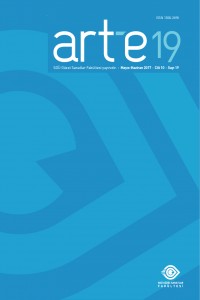Biyografi
Yıl 2017,
Cilt: 10 Sayı: 19, 1 - 37, 17.07.2017
Öz
Bu
çalışma Warburg’un Pathosformel
olarak adlandırdığı yöntemin teorik bağlamda nasıl karakterize edildiğini ve
bir sanat tarihi yöntembilimi olarak nasıl kullanıldığını analiz edecektir.
Çalışmanın ilk bölümü Aby Warburg’un yaşantısı ve Pathosformel yaklaşımın ortaya çıkışını tarihi bir izlekte ortaya
koymaya çalışacaktır. İkinci bölümde ise yaklaşımın bellek kuramları ile olan
ilişkisi Mnemosyne (bellek) Atlası üzerinden incelenerek bir sanat tarihi
kuramı olarak kültürel analiz ve imgelerin kültürlerarası örtük bağları
üzerinde durulacaktır.
Anahtar kelimeler:
Pathosformel, bellek, Rönesans, ikonoloji, metodoloji
Anahtar Kelimeler
Kaynakça
- Agamben, G.,(2013) Nymphs, trsl: Amanda Minervini, Seagulls Books: Utah
- Agamben, G., (1994), “Aby Warburg and the Nameless Science”, Potentialities, trsl: Daniel Heller Roasen, Stanford University Press: Standford 89-166
- Akay, A.,(2006) Sanat Tarihi Sıradışı Bir Disiplin, Yapı Kredi Yayınları: İstanbul
- Buchloh, B.,(1999) “Gerhard Richter's "Atlas": The Anomic Archive” , October, Vol. 88 (Spring),The MIT Press, pp. 117-145
- Campbell, J.,(1991). The Power of Myth (with Bill Moyers). Anchor Books edition (non-illustrated smaller-format edition). s. 111.
- Cassirer, E.,(1925), Dedication letter to Aby Warburg, in Idem, The Individual and the Cosmos in Renaissance Philosophy transl. by M. Domandi, Oxford, Blackwell, 1963
- DeMallie, R,J. ed. (1985). The Sixth Grandfather: Black Elk's Teachings Given to John G. Neihardt, University of Nebraska Press. s. 47.
- Durantaye, L.L., (2008) “Ghost Stories for the Very Adult” The Believer, January, Volume 6, Number 1. 26-30Fernie, E. (1995) Art History and Its Methods: A Critical Anthology, Phaidon, London
- Ginzburg, C., (2007) Efsaneler Amblemler İzler, Morfoloji ve Tarih, çev: Mehmet Moralı, Kırmızı Yayınları:İstanbul
- Gombrich,E. H.,(1999) “Aby Warburg: His Aims and Methods: An Anniversary Lecture”
- Journal of the Warburg and Courtauld Institutes, Vol. 62. pp. 268-282.
- Hodapp, Christopher L.,(2010) Deciphering the Lost Symbol: Freemasons, Myths and the Mysteries of Washington, D.C. Ulysses Press: Berkeley.
- Iversen, M., Melville, S., (2010) Writing Art History, Disciplinary Departures, Universtiy of Chicago Press: Chicago.
- Johnson, C., (2012) Memory, Metaphor, and Aby Warburg’s Atlas of Images, Cornell University Press: New York.
- Kaek, M.,(2016), “Of Marble Women and Sleeping Nymphs”, Translating Myth, ed: Ben Pestell, Pietra Palozzolo, Leon Burnet, Routledge: New York. s.131-144
- Manguel, A.,(2008) Geceleyin Kütüphane, çev: Dilek Şendil, Yapı Kredi Yayınları: İstanbul
- Markman, P., Markman, R., (1989) Mask of the Spirit: Image and the Metaphor in Mesoamerica, University of California Press: Berkeley
- Mooney, J.,(1896) The Ghost Dance Religion and Wounded Knee, Dover Publications: New York
- Papapetrosi S.,(2010), “World Ornament”, Anthropology and Aesthetics, Res 57/58 Spring Autumn, s. 309-330
- Preziosi, D., der.(1998) The Art of Art History: A Crritical Anthology, Oxford University Press, Oxford, New York
- Rampley, M.,(2001), “Mimesis and Alegory: On Aby Warburg and Walter Benjamin”,Art History as Cultural History, ed. Richard Woodfield, Overseas Publ: Amsterdam, s. 121-151.
- Russel, Mark, A., (2007) Between Tradition and Modernity, Berghahn Books: New York
- Steinberg, P.M., (1995) “Aby Warburg’s Kreuzlingen Lecture: A Reading”, Images From The Region of the Pueblo Indians of North America, Aby M Warburg, Cornell University Press:Ithaka pp: 59-110
- Warburg, A., (2001) “The Entry of the Idealizing Classical Style in the Painting Of Early Renaissance”, Art History as Cultural History, ed. Richard Woodfield, Overseas Publ: Amsterdam. pp.7-33
- Warburg, A.,(1999) “Dürer and Italian Antiquity, 1905”, The Renewal of Pagan Antiquity: Contributions to the Cultural History of the European Renaissance, Translation by David Britt Getty Center for the History of Art and the Humanities: Los Angeles, pp.555-558
- Warburg, A., (1999) “Pagan-Antique Prophecy in Words and Images in the Age of Luther,1920”, The Renewal of Pagan Antiquity: Contributions to the Cultural History of the European Renaissance, Translation by David Britt Getty Center for the History of Art and the Humanities: Los Angeles, pp.597-667
- Wind, E., (2009), “Warburg’s Concept of Kulturwissenschaft and its Meaning for Aesthetics”, The Art of Art History, Ed. D. Preziosi, New York: Oxford University Press, s. 189-194.
- Wolf, G.,(2016), “Warburg’s Boticelli and Boticelli’s Nymph”, Boticelli Re-Imagined, ed. Mark Evans, Stefan Weppelmann, Victoria Alberts Publishing: Londra, s.102-106.
- Zilberg, J., (2011) “A Note On Warburg”, Transtechnology Research, Plymouth University
Toplam 29 adet kaynakça vardır.
Ayrıntılar
| Bölüm | Makaleler |
|---|---|
| Yazarlar | |
| Yayımlanma Tarihi | 17 Temmuz 2017 |
| Gönderilme Tarihi | 4 Nisan 2017 |
| Kabul Tarihi | 9 Haziran 2017 |
| Yayımlandığı Sayı | Yıl 2017 Cilt: 10 Sayı: 19 |
Cited By
Aby Warburg ve Sinema İlişkisi Üzerine Bir Deneme
Yüzüncü Yıl Üniversitesi Sosyal Bilimler Enstitüsü Dergisi
https://doi.org/10.53568/yyusbed.1258569
Art-e 12/1/2011 yılından sonraki sayıları tam metin olarak, 12/1/2008 yılından sonraki sayıları ise indeks olarak EBSCO'da Art Source isimli veri tabanında yer almaktadır.


